ECRM's Store Brands Summit: Retailer Presentation Highlights 4/24/2019
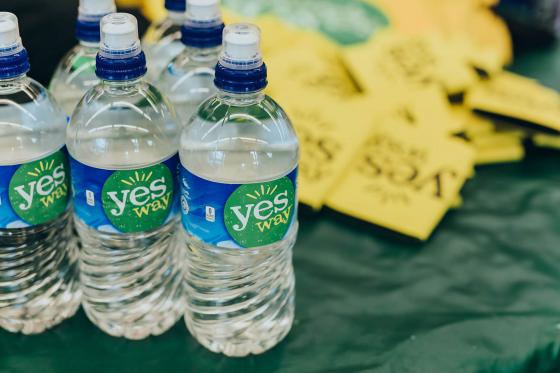
ECRM’s Store Brands Leadership Summit, held during its Store Brands Week earlier this month, featured two concurrent educational tracks that provided a half-day of educational presentations to private label buyers and suppliers in attendance. The Marketing Services Presentation Track, which was open to all attendees, was emceed by ECRM VP of Content Joseph Tarnowski and featured presentations on industry trends as well as one presentation on developing impactful store brands packaging.
The Retailer Presentations Track was moderated by ECRM SVP of Retail Wayne Bennet, and was for suppliers only, as it featured five retailers who discussed how suppliers can best partner with them for success. This was the track that I sat in on and while most of the presentations were private, I was able to report on two of them, the presentations from Giant Eagle and Yesway.
Below are these articles on each – originally posted on the Store Brands website – as well as one video of ECRM’s Tarnowski interviewing me about some key takeaways from the retailer presentations, and another video in which he interviews Wayne Bennett about the benefits for both retailers and suppliers participating in the Leadership Summit.
Giant Eagle spreading its wings with its private brands
Giant Eagle’s Brooke Hodierne threw down the gauntlet against national brands during her presentation at the Efficient Collaborative Retail Marketing’s (ECRM) second-annual Store Brands Leadership Summit held April 8 at Bally’s Las Vegas Hotel & Casino.
“We have to get ahead of national brands; their innovation is lacking at best,” said Hodierne, vice president of own brands for Pittsburgh-based Giant Eagle. She was speaking to a group of suppliers who attended the Store Brands Leadership Summit as part of ECRM’s “Store Brands Health & Beauty Care,” “Store Brands Foods: Center Store” and “Store Brands Foods: Perimeter of the Store” Efficient Program Planning Sessions (EPPS) held last week.
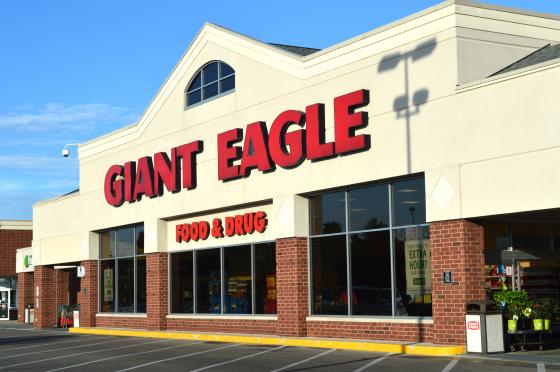
Hodierne said she believes the national brand consumer packaged goods (CPGs) companies realize that retailers with private brands are coming after them “at a faster rate than ever before” — and with products that are simply better and offer more value.
“And we’re bringing resources that we haven’t brought before,” she said. “We are really challenging the business.”
And that includes Giant Eagle. During her presentation, Hodierne unveiled a totally new approach that the retailer is taking with its private brand program, which includes three tiers: Giant Eagle, the retailer’s national brand equivalent line; Nature’s Basket, an organic, natural and free-from line; and Market District, a specially curated line of products for food enthusiasts.
“We are thinking about our own brands differently,” Hodierne said. “We used to be the me-too [product] and the fast-follower. But we’ve taken that model and thrown it out the window.”
Hodierne said Giant Eagle is now reviewing categories “through the lens of our own brands.”
If the category is ice cream, it’s no longer about analyzing it to find out where Giant Eagle’s store brand products fits in. It’s about taking the category and deciding where the national brands fit in around Giant Eagle’s private-branded products.
Get this: In time, Hodierne wants to grow Giant Eagle’s private label market share to a European-esque 40%.
“It’s super inspirational,” she said of the goal.
Hodierne pointed out that she and her team members no longer want store brand products that are just better than the national brands — they want store brand products that are better than other retailers’ store brands.
“We’re setting our targets against our peer retailers’ [private-branded] products,” she added.
For instance, in the potato chip category, Hodierne said she doesn’t care about Lay’s products.
“I care about what’s happening with [ALDI’s] Clancy’s [potato chip brand] because they are eating my lunch.”
Hodierne said she wants suppliers who operate with the givens, such as offering consistent quality and adhering to strict food safety measures. But she also wants to work with suppliers that have an “entrepreneurial spirit.”
“I’m not afraid to take leaps,” she noted.
At Giant Eagle, a family-owned company that began in 1931 and now operates 216 supermarkets and 258 convenience outlets, Hodierne said she expects herself and her team members to make mistakes and to learn from them.
“If people on our team have no failures, then we aren’t trying hard enough,” she said.
Something tells us that Giant Eagle’s store brands are about to make some serious headway in the near future.
Yesway affirmative on private brands
Derek Gaskins wants Yesway to be the ALDI or Lidl of the convenience store channel when it comes to private brands.
“We want to be one of the innovative retailers,” said Gaskins, who spoke April 8 at the Efficient Collaborative Retail Marketing’s (ECRM) second-annual Store Brands Leadership Summit held at Bally’s Las Vegas Hotel & Casino. “Why can’t we be the Lidl or Aldi of the convenience channel? It’s an aspiration that we are treating very seriously.”
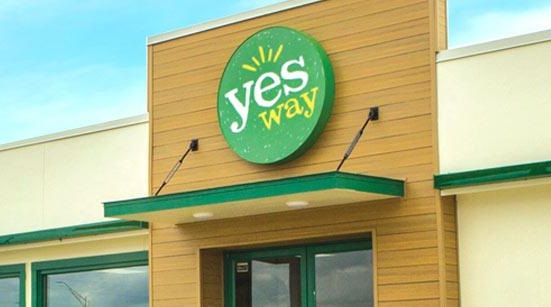
Gaskins, senior vice president of merchandising and procurement for Des Moines, Iowa-based Yesway, a new convenience store chain, spoke to a group of suppliers who attended the Store Brands Leadership Summit as part of ECRM’s “Store Brands Health & Beauty Care,” “Store Brands Foods: Center Store” and “Store Brands Foods: Perimeter of the Store” Efficient Program Planning Sessions (EPPS). Gaskins, aware that ALDI and Lidl both offer more than a 90% assortment of private brands, said Yesway, which was born in 2015 and began opening stores in 2016, wants to make private brands a staple of its success.
Yesway, which operates more than 150 stores in Iowa, Kansas, Missouri, Oklahoma, Texas, Nebraska, New Mexico, South Dakota and Wyoming, is growing rapidly and soon plans to have about 500 stores opened. Gaskins noted there are more than 153,000 convenience stores in the U.S. with nearly two-thirds of them owned and operated by individuals. He believes Yesway has the opportunity to make an impact in the “highly fragmented” channel.
Yesway launched its first private-branded products, under the Yesway brand, last summer. It currently offers about 40 SKUs, including water, candy and baked goods, and has more than 400 new products in its pipeline.
“When we started, it was about going after the low-hanging fruit,” Gaskins said. “[Knowing] beverage was a destination [for our stores], we knew we should have beverages. So we offered water first.”
Gaskins said Yesway will soon offer three tiers of private brands: value, national brand equivalent and premium.
“We want to go places where national brands in a convenience channel have not been willing to go,” he said of premium offerings.
Gaskins said Yesway has been focusing on offering “immediate consumption” products such as “high velocity, high impulse and high margin opportunities” that include packaged baked goods and candy.
“We will probably keep that focus through the third quarter of this year, but we are looking at the center store and the frozen [category] as big opportunities,” said Gaskins, who joined Yesway last summer after leaving Rutter's, a York, Pa.-based convenience store chain. “A line of own brand meal solutions could also be a traffic driver for us.”
Gaskins said the days of the blue-collar construction worker being the lifeblood of the convenience store channel are long gone.
“Generation Z and millennials are the ones who are in our stores now, and they are forcing us to be more transparent and have clean labels and carry products that as recently as five years ago I would have never thought about carrying,” he said.
During his presentation, Gaskins said the words “simplify and amplify” several times.
“That means doing fewer things better,” he added. “To simplify and amplify has been transformative in how we go to market.”
ECRM's Joseph Tarnowski & Store Brands' Larry Aylward
ECRM's Joseph Tarnowski & Wayne Bennett
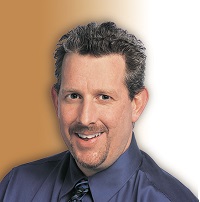



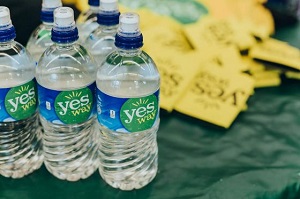
Store Brands (www.storebrands.com) delivers the strategic and tactical information retail executives need to develop and support compelling, differentiated store brand programs. From industry trends and opportunities to innovation tools and store brand success stories, Store Brands provides actionable ideas for maximizing quality and profitability in store brand programs.